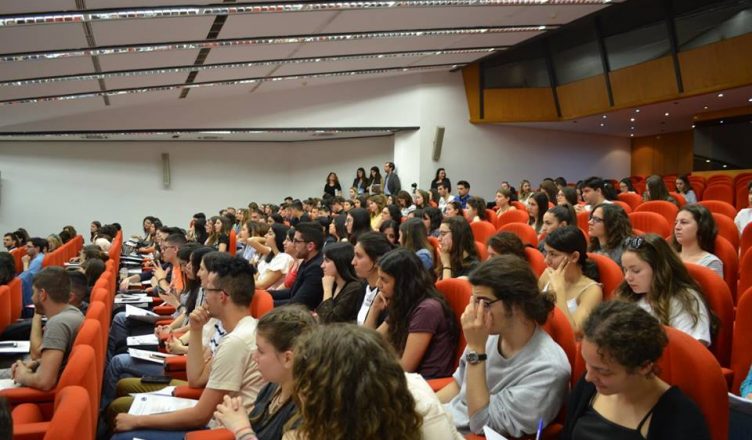Conference on Turkish & Eurasian Studies
“Democratization, Strategy and Economic Relations. Turkey and Eurasia”
University of Piraeus, 25th of April, 2018.

On April 25th, 2018 the Turkish and Eurasian Studies Laboratory of the Department of International and European Studies of the University of Piraeus organized an informative scientific conference under the topic of “Democratization, Strategy and Economic Relations. Turkey and Eurasia”. The conference took place in the Conference Hall of the University of Piraeus.

The conference’s keynote speaker was Ambassador (ret.) G. Gennimatas, General Secretary of the Presidency of the Hellenic Republic. The title of his speech was “Turkey and strategic developments in the wider Eastern Mediterranean”.
The conference consisted of five sessions. The speakers were both esteemed Professors, teaching staff, experts, journalists, researchers, and research fellows of the Turkish and Eurasian Studies Laboratory of the Department of International and European Studies of the University of Piraeus. Professors, researchers, journalists, students and the public attended the conference.

In the first session entitled: “The challenges of the democratic governance in Turkey” speakers focused on the drift of Turkish democracy away from western standards, the role of the President, R.T. Erdogan, and the impact of the aforementioned drift to the Turkish political system. Initially, the restrictions of academic freedoms that followed the Coup attempt were examined, while focusing on the consequences of human rights abuse on the democratic governance. Researchers also addressed to the Justice and Development Party’s (JDP) policy and the changeover towards Kurdish citizens after the concentration of most powers in the hands of the President, R T. Erdogan. The session was completed with the examination of the factors that led the Kemalist’s faction to a gradual reduction and incapacity to claim the power through democratic procedures, focusing on the policy of the Republican People’s Party (RPP) after the Coup attempt in 2016 and the controversial Referendum in 2017.

The second session, entitled “Foreign Policy Issues”, examined current matters of foreign affairs of Turkey and Eurasian states. At first, researchers focused on the strategic reasons that lay behind the use of political violence against the Iraqi and Syrian Kurds. Following, the rapprochement between Russia and Turkey was discussed. Special attention was paid to the question of whether there are political reasons behind the deal to purchase the Russian air defence missile sytstems S-400 against the wish of the NATO allies. Moving on, researchers examined the crisis between U.S. and Turkey, while focusing on issues of bilateral and regional concern, such as the Zarrab case and the American recognition of Jerusalem as the capital of the Israeli state. The panel continued with the Greek-Turkish relations and examined Turkey’s offensive behavior toward Greece, which aims to undermine the regional stability in the area. Greece’s dissuasive strategy was also examined. Finally, the adhesion process of Georgia in the Euro-Atlantic institutions, with a particular focus on the consequences for the Regional subsystem of Caucasus, was also examined.

The third session focused on the “Strategic and Security issues in the Eastern Mediterranean”. The panel, which consisted of professors of the University of Macedonia (Thessaloniki, Greece), the Panteion University (Athens), as well as the University of Piraeus, discussed strategic issues in the Greater Middle East with focus on issues such as factors of instability in the area, revisionist attitudes and security.

The fourth session of the conference, entitled “Regional competition and the policy of the Great Powers”, consisted of presentations concerning the regional competition in the Middle East. Firstly, the importance of the hydrocarbons of the Eastern Mediterranean for Turkey and the active role of Ankara, were discussed. Following, speakers examined the modern Russian policy on South Caucasus, as it has been shaped after the civil war in Syria and the crisis in Ukraine. Moreover, the panel shed light on the antisystemic groups of political violence that redefine “Security” in the Middle East. During the session the matter of regional competition between Saudi Arabia and Iran, was also discussed. Additionally, speakers focused on the consequences on the power balance in the Middle East, while U.S and Russia try to preserve their national interests by creating strategic alliances. The panel concluded with a presentation regarding the foreign policy of D.J. Trump in the Middle East and whether it will defer from that of his predecessors.

The fifth and last session entitled “International Economic & Energy Relations”, touched upon vital economic and energy matters in Turkey and its surrounding region. In the beginning, researchers examined the Russian Energy Strategy in the Middle East, which is oriented on empowering Russia’s position in the area. The panel continued by examining the role of energy actors in Caucasus, with a specific focus on the case of SOCAR. Following, researchers discussed Ankara’s drift away from the EU, as well as the political and economic consequences. Lastly, the Chinese project OBOR and its impact in the Eastern Mediterranean, was examined, as an attempt of Beijing to increase its influence on the region.
Nelly Georgiadis
Member of PR Unit, TES Lab.

